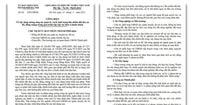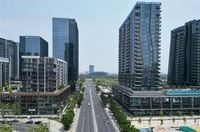The real estate landscape in Vietnam is witnessing significant changes as various local authorities and organizations push for new regulations and projects aimed at enhancing housing and urban development. On April 23, 2025, the Ho Chi Minh City Real Estate Association (HoREA) made a notable proposal to the municipal government, urging the removal of a ban on short-term apartment rentals. This recommendation comes in light of the ongoing debate surrounding the legality and management of short-term rental properties, particularly those listed on platforms like Airbnb.
HoREA's Chairman, Le Hoang Chau, emphasized that short-term rentals are a legitimate business activity that should be regulated under specific conditions rather than outright banned. He pointed out that the current regulation, which was enacted on February 27, 2025, allows short-term stays only in mixed-use apartments or those licensed for tourism services. This restriction, according to Chau, is inconsistent with the 2023 Housing Law and creates disparities as other localities do not impose similar bans.
According to a survey, Ho Chi Minh City is home to approximately 8,740 apartments available for short-term rental through various online platforms. This sector reportedly generates jobs for between 8,000 and 17,000 individuals. The abrupt enforcement of the rental ban has posed significant challenges for many landlords, forcing them to breach contracts and transition to long-term rentals, which often leads to difficulties in securing tenants. Chau warned that such prohibitions not only threaten the livelihoods of numerous households but could also diminish the city's attractiveness to tourists compared to other regions.
In response to this growing concern, HoREA is advocating for a clearer legal framework that recognizes Airbnb-style rentals as a legitimate business, suggesting that the government implement strict management measures, including registration and tax compliance.
Meanwhile, in Hanoi, significant developments are underway with the recent groundbreaking of the Capital One project by the Vietnam Construction Corporation (Vinaconex) on April 22, 2025. This ambitious undertaking, located in the Kim Van - Kim Lu urban area of Hoang Mai district, boasts a total investment of approximately 3,900 billion VND and covers an area exceeding 11,700 square meters. The project features two 30-story towers, four basements, and will house commercial centers, office spaces, service apartments, and a five-star hotel with over 400 rooms.
Vinaconex aims to establish Capital One as a key architectural landmark and a high-quality service center at the southern gateway of Hanoi, contributing to the region's socio-economic development. The company has set a consolidated revenue target of 15,000 billion VND for 2025, with an after-tax profit goal of 1,200 billion VND, while maintaining a dividend rate of 16%. Real estate continues to be a core sector for Vinaconex, expected to contribute 70-75% of its profits.
In another development, the Chairman of the Hanoi People's Committee, Tran Sy Thanh, has signed Official Dispatch No. 04, which calls for enhanced management and strict enforcement against land encroachment amid administrative unit restructuring. Recent reports indicate that some individuals and organizations have exploited the changes in administrative boundaries to illegally occupy land, lakes, and agricultural fields, leading to unauthorized construction.
The official directive holds district-level leaders accountable for land management and construction order within their jurisdictions. It emphasizes the need for immediate action against illegal encroachments and constructions, which not only undermine state management but also pose risks of disputes and public unrest. The Hanoi People's Committee has also issued Official Letter No. 1601/UBND-DT, further reinforcing the need for rigorous construction order management until the completion of administrative mergers.
Local authorities are tasked with raising public awareness and ensuring compliance with legal regulations to prevent illegal land occupation. The Department of Agriculture and Rural Development is responsible for reviewing and documenting land use, particularly in areas at risk of encroachment, while the Department of Construction is directed to enhance oversight of construction activities.
As part of these efforts, the Hanoi government has committed to establishing a transparent and efficient process for managing land and construction, aiming to restore order and trust among the populace. Enhanced cooperation among various governmental bodies is essential to tackle complex cases that exceed local jurisdictions and to mitigate the potential for future violations.
Moreover, the Hanoi government has introduced a new pricing framework for the management and operation of apartment buildings, effective May 1, 2025. This decision aims to ensure transparency and fairness in service fees collected from residents. The new pricing structure outlines monthly fees for buildings without elevators ranging from 700 to 5,000 VND per square meter and for buildings with elevators from 1,200 to 16,500 VND per square meter. However, these rates exclude premium services such as swimming pools and internet access.
The framework applies to various stakeholders, including government housing authorities, developers, management boards, and residents. It is designed to prevent disputes and ensure that service fees are justified and equitable. The Hanoi People's Committee has tasked the Department of Construction with monitoring and adjusting these prices in response to changes in material costs and wages.
In light of these developments, the real estate sector in Vietnam is poised for transformation, balancing regulatory measures with the need for growth and sustainability. As stakeholders navigate these changes, the focus will remain on ensuring that housing solutions are accessible and that urban development aligns with the needs of the community.


